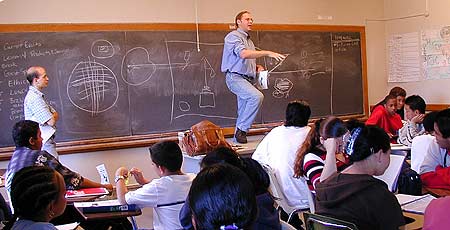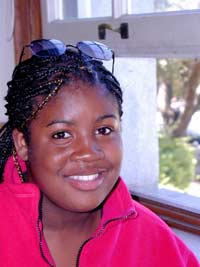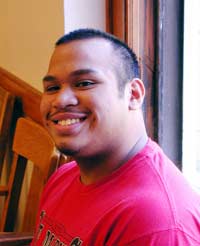
YEAH
summer instructors Steve Wourgiotis (left) and Phil O'Neill
(on table) give local teenagers a crash course in economics.
(Bonnie Powell photos) |
Mind your
own business: Local
teenagers learn the entrepreneurial ropes — and start thinking
about college
8
August 2002
By Bonnie Azab Powell, Public Affairs
BERKELEY — With CEOs who once smirked on the covers
of Fortune and BusinessWeek now reduced to mug shots, you'd
think that "entrepreneur" would have fallen off teenagers' top
10 careers lists. But according to the 40 East Bay ninth-graders
who recently spent two weeks at the Summer Entrepreneur Camp
run by UC Berkeley's Haas School of Business, nothing beats
working for yourself.
"I really like clothes, so I'm going to start my own clothing
business," says Corey Williams, 14, who will attend Richmond's
Salesian High School in the fall. "It'll be called WooGear,
because when people see my stuff, they always say 'Woooooo!'"
Williams has already lined up an artist to draw his logo and
a graphic designer who'll give him a discount on printing t-shirts,
hats, and other Woo-inspiring items. So what did he have left
to learn at business camp? "Things like how to manage my money,
do marketing — flyers and stuff — and making my prices
reasonable," he answers earnestly.
He got a crash course in all of the above, as well as in Business
English, PowerPoint presentations, teamwork principles and lots
more, during the July 22-Aug. 2 summer camp. But this camp is
just the beginning of the two-year Young Entrepreneurs Program
(YEP), which pairs youth from local public and private high
schools with individual Haas MBA student mentors for every-other-Saturday
meetings during the school year. YEP has a sister project, the
Business, Economics, Technology Achievement Program, through
which Haas undergraduates get involved in local middle and high
schools. Both community outreach programs are run by the Young
Entrepreneurs at Haas (YEAH) group.
 |
| Budding
architect Jasmine Wyrick |
Summer camper Jasmine Wyrick, who'll be starting at Berkeley
High in the fall, also already has a name for her future business:
Jasmine's Jazziest Homes and Buildings. In addition, the budding
architect has a first prototype in mind — a house shaped
like a crystal ball that will unpeel like an orange to open.
"I came here because I like to draw and to shape my future,"
the girl whispers shyly. "And if I didn't do it my mom would
have signed me up."
Asked if she was glad she came, she nods. "I didn't know a
preteen like me could do architecture, because most adults don't
think kids can know about houses," she says. "Now I'm going
to try and get an internship or something."
Getting with the program
To be accepted into YEP, the students must fill out an application,
get a letter of reference from a teacher or counselor, and go
through an interview with the program's mentors. They also have
to promise to stick with the program for the full two years.
"We look for students who are almost, but not quite, on the
path to college," says Oscar Wolters-Duran, YEAH's director.
"There are a couple of students with 4.0 grade point averages
and a few with 2.5s. But we mostly try to attract the ones in
the middle who are falling through the cracks."
Steering students onto the college path is YEAH's main goal,
and in the 12 years it has been operating, it has succeeded
admirably. Nearly all the youth who complete the program have
gone on to higher education, whether Ivy League schools, community
colleges or the Culinary Institute of America. Several have
gone on to business school.
"While they're learning this broad range of business, finance,
economics, and entrepreneurial skills, they're also learning
a lot about the college pathway: what they have to do in high
school to make sure they're eligible to apply to higher education,"
says Wolters-Duran.
Improving the odds for success
That message certainly hit home with Rodney Acda, a senior
at St. Mary's High School in Berkeley and now a team leader
for the first-timers at the summer camp. An ebullient young
man who wants everyone to know he's "single, 5'6 and a Capricorn,"
Acda says he enrolled in YEP when he was a freshman partly because
he had heard that everyone who did so was later accepted to
UC Berkeley. "Then somewhere along the way I discovered I had
a passion for business," he explains, "and I started to really
apply myself."
Acda worked hard honing his entrepreneurial idea on his Saturdays
with his MBA student mentor, Christine Marr. It paid off: he
won first place at the venture capital competition capping the
first year of YEP, when the teenagers present their business
plans to Haas faculty, local business leaders and MBA students.
 |
| Rodney
Acda, YEAH team leader and someday juice-bar owner |
Acda has yet to spend his $500 prize. Instead he is still working
on the business plan for his "cultural drinks" shop, in which
customers can taste beverages from all over the world such as
halo-halo, a Filipino drink mixing beans, coconut meat, fruit,
crushed ice, and condensed milk. "I know I'm going to struggle,"
Acda says. "That's why I really want to make sure I know what
I'm doing before I start it, so I'm going to get an MBA at Haas
first." He winks.
For this year's summer instructors — Phil O'Neill, Haas
MBA '02, and Steve Wourgiotis, who will finish his degree this
December — the program is a chance to "give back to the
community," says Wourgiotis. "These are bright, great kids.
It's nice to make a difference, but it's also just a fun and
rewarding place to be."
O'Neill, who was a YEAH mentor last year, admits that the responsibility
can be a big commitment for first-year MBA students. "Continuity
from year to year can be difficult. It's a lot to ask, but I
tell people it's really worth it," he says. He estimates that
roughly 20 percent of Haas's MBA classes participate as YEAH
mentors.
O'Neill and Wourgiotis crammed a lot into the camp's two weeks.
On the fourth day of the program, for example, the students
discussed whether it was OK for athletic shoe companies to charge
$100-plus for shoes worn by low-income teenagers (surprisingly,
the consensus was "yes"); learned about quality control for
their products; listened to a guest speaker, Matt Campbell,
who founded an adaptive optics company; discussed the ethics
of product piracy; had "BizWorld," a manufacturing lesson; and
spent time in the computer lab learning basic computing skills.
The students were particularly interested in Campbell's experience
as an entrepreneur. A recent Haas MBA graduate, Campbell and
his cofounders won last year's Haas Business Plan Competition
as well as the MBA Jungle Business Plan Challenge with the idea
for their company. Iris AO (formerly Adaptic Systems) is now
working on a prototype of its technology, a tiny chip-like device
using mirrors that will greatly improve the examination process
for optometrists, among other applications.
Patent weather
After Campbell explained in simple terms how the device works
and talked about having filed for a patent, the questions came
fast and furious. His audience wanted to know how to apply for
a patent, whether people could steal ideas from the application,
what Iris AO did with all the products that didn't work, whether
Campbell liked his coworkers, and most importantly, what background
he had used for his winning PowerPoint presentation.
Raising his hand, Acda inquired, "Do you think this company's
actually going to get off the ground?"
"I hope so," Campbell said.
Not missing a beat, Acda shot back, "Then can I have a job?"
When Campbell answered "You bet," the room erupted with cries
of "Me too!"
Clearly, while these students admire those who work for themselves,
they know it might take some time to get those dj businesses,
clothing labels and architecture firms up and running.
More information
about the YEAH program
|